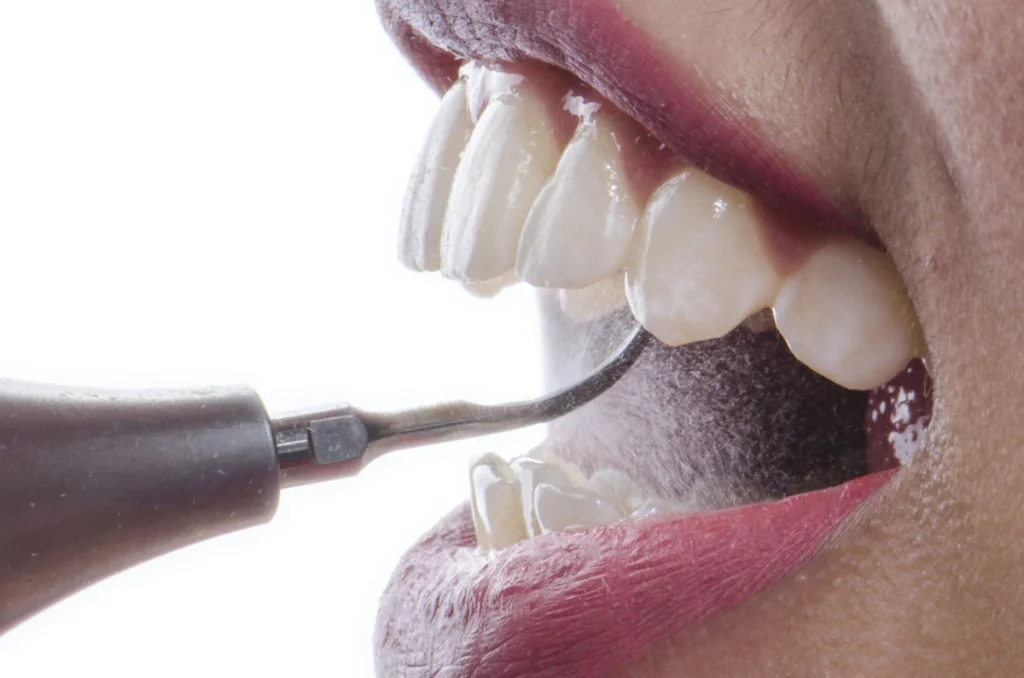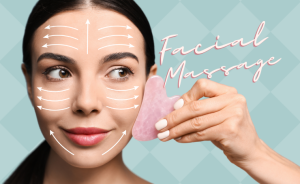What is dental scaling? What are the benefits and importance of dental scaling? Does scaling damage the teeth? What happens if we don’t scale the teeth?
Consuming our daily meals and drinks causes the accumulation of plaque and tartar on the teeth. Although regular brushing can help to remove it, however, plaque on the teeth is a common problem that can cause serious problems for the health of the teeth and gums.
Dental scaling is a method to clean the teeth below the gum line. In this method, the surface of the teeth is deeply cleaned to protect the tooth enamel and gums. Dental scaling is a necessary and important process that helps maintain the health of the mouth and teeth.

How Is Dental Scaling Done?
Dental scaling is one of the most common methods for cleaning the tooth surface, which must be performed by a doctor using special equipment in the office. This procedure is usually done to help patients with gum disease and people with excessive plaque build-up.
Dental scaling is a process in which the specialty known as oral hygiene removes contaminants on the surface of the teeth and inside the gums through the use of various tools and techniques. This process is done regularly and periodically to prevent the accumulation of pollutants.
Dental scaling steps
Tooth scaling is usually done in several steps. In the following, you can learn about the stages of tooth scaling.
Initial dental examination
Before you start, you’ll have a brief dental exam to check for plaque, tartar, or other buildup that threatens your oral health. At this stage, the doctor carefully examines your teeth and determines the amount of dental caries. If you’re considering treatments like Invisalign to straighten your teeth, this initial check-up ensures your mouth is healthy and ready for the procedure.
Use of local anesthesia
A light anesthetic, usually in the form of a topical cream, numbs the treated area. You will probably feel some uncomfortable movements, but the procedure is non-surgical and does not damage the teeth or gums.
Dental scaling
Then the dentist uses a special device for scaling. In fact, the dentist scrapes all the plaque inside the teeth and around the gums with a small scaler tool and removes the buildup. Scaling is an essential part of professional teeth cleaning and cleans teeth much deeper than regular brushing, playing an important role in maintaining dental health.
Smoothing the sides of the gum
The dentist or hygienist will smooth the rough edges of the roots of your teeth and remove plaque using a tool called a dental coret. Doing this means the gums can move back into position much more easily and without any discomfort.
Smoothing the sides of the gum
The dentist or hygienist will smooth the rough edges of the roots of your teeth and remove plaque using a tool called a dental curette. Doing this means the gums can move back into position much more easily and without any discomfort. In cases where deep infection has affected the tooth pulp, additional treatments like root canal treatment might also be recommended alongside gum care.
The benefits and importance of dental scaling
Dental scaling is an important process to help maintain healthy teeth. In the following, you can learn more about the importance of dental scaling.
One of the most important benefits of scaling teeth is to remove contamination, maintain gum health, and prevent oral and dental diseases.

Removal of contamination
By performing scaling, contaminants such as plaque and tartar are removed from teeth and gums and you get one step closer to having a Hollywood smile. These pollutants can cause bad breath, gum disease and tooth decay.
Maintaining gum health
Dental scaling helps maintain gum health. Healthy and inflammation-free gums play an important role in maintaining teeth and are also necessary for dental implants and prostheses.
Prevention of oral and dental diseases
Regular dental scaling can be effective in preventing oral and dental diseases such as tooth decay, periodontitis (gum inflammation) and other gum diseases.
Frequently Asked Questions
Below we answer some of the most common questions that patients ask us.
When should teeth scaling be done?
It is recommended to do dental scaling at least twice a year. But in some cases, it may be necessary to charge earlier or once every 6 months. It is better to talk to your dentist about the right timing for scaling.
Is it possible to remove dental scaling at home?
Teeth scaling was done a while ago and at the time of our grandparents with natural materials at home. But today, new methods and devices are available to remove dental scaling at home.
The truth is that the best method of scaling is done by an experienced dentist with special equipment. If you take a look at the photos of teeth scaling before and after doing this, you will notice that the tooth surface is completely clean after scaling and the teeth get a special shine and whiteness that these results are not usually achieved with home methods.
Therefore, it is suggested to perform scaling in a dental office under the supervision of a doctor so that both the surface of the teeth is deeply cleaned and there are no problems with the health of your gums.
Is dental scaling effective for teeth whitening?
Scaling helps to remove deposits and plaque on the teeth. In many people, these masses are black in color and in others yellow, which can give a dark and unattractive appearance to the teeth. By removing these contaminations, scaling not only improves oral hygiene but also helps brighten and whiten the teeth, giving them a more radiant and clean look.
What happens if we don’t scale the teeth?
Accumulation of dirt and pollution on the surface of the teeth causes these debris to accumulate over time and the health of our teeth and gums is compromised.
When calculus is not removed and the calculus remains on the tooth for a long time, the bone supporting the tooth and the gums begin to degenerate, and this will cause the teeth to loosen and decay. In addition, neglecting the removal of plaques causes the colors to become darker and give an ugly appearance to our teeth.
Is teeth scaling allowed for children?
Removing dental plaque in children can help prevent tooth decay, gum disease, as well as the health of the child’s mouth and teeth, and is a suitable method for the health of children’s teeth.
Can teeth be scaled with baking soda?
Yes! Using a combination of baking soda with a small amount of vinegar can help whiten teeth to a great extent. But if there are thick plaques on the sides of the teeth and close to the gums, you should use dental plaque removal in the office.
Is teeth scaling allowed during pregnancy?
In response to the question of whether teeth scaling is harmful during pregnancy or not, we must say that oral and dental hygiene is very important during pregnancy. Scaling is a safe way to remove plaque and contamination on the teeth, which you can also do during pregnancy.
Disadvantages of dental scaling
Does scaling damage the teeth? Have you ever heard about the disadvantages of dental scaling? In general, dental scaling is one of the oral health care methods that is usually performed by dentists.
This method includes cleaning and removing bacterial layers and deposits that form on the surface of the teeth. Although dental scaling is known as a useful method to maintain oral health, it also has some disadvantages.
Disadvantages of scaling are mostly due to factors such as experience and skill of the dentist, use of correct equipment and hygiene. Therefore, choosing a skilled and professional dentist can reduce the risks associated with dental scaling. In the following, you can learn more about the disadvantages of removing dental plaque in the office.
Tooth sensitivity
Some people may experience tooth sensitivity after scaling. This sensitivity may be due to the contact of the scaling tool with the surface of the teeth or stimulation of the dental nerves. This sensitivity is usually temporary and resolves in a short time.
bleeding gums
In some cases, dental scaling can lead to bleeding gums. This issue may be caused by the contact of the scaling tool with the soft tissues of the gums. If you have heavy or prolonged bleeding, it is better to visit your dentist.
Gum damage
If scaling is done incorrectly or with too much pressure, the gums may be damaged. This problem usually occurs if scaling is done by a non-specialist or if the dentist uses inappropriate tools.
infection
If the tools and equipment are not sterile, dental scaling can increase the risk of infection. So, make sure your dentist uses clean, sterile tools to remove plaque.
Other problems
In some cases, dental scaling may lead to other problems such as tooth breakage or damage to its veneer. These problems are mostly due to factors such as weak teeth, use of inappropriate tools or old equipment.
Some tips for the durability of teeth scaling
To ensure the durability of teeth scaling and maintain good oral health, here are some tips:
- Practice good oral hygiene: Brush your teeth at least twice a day using a soft-bristle toothbrush and fluoride toothpaste. Make sure to brush along the gumline and all tooth surfaces to remove plaque and prevent tartar buildup.
- Floss daily: Use dental floss or interdental cleaners to clean between your teeth and along the gumline. This helps remove plaque and food particles that can contribute to tartar formation.
- Maintain a balanced diet: Limit your consumption of sugary and acidic foods and beverages, as they can contribute to tooth decay and weaken the teeth. Instead, opt for a diet rich in fruits, vegetables, lean proteins, and dairy products, which provide essential nutrients for strong teeth and gums.
- Avoid tobacco and alcohol: Smoking and chewing tobacco can stain your teeth and promote tartar buildup. Excessive alcohol consumption can also contribute to oral health problems. Quitting tobacco use and moderating alcohol intake can help preserve the results of teeth scaling.
- Visit your dentist regularly: Schedule regular dental check-ups and cleanings to monitor your oral health and address any issues promptly. Your dentist can perform professional cleanings to remove tartar buildup that’s difficult to reach with regular brushing and flossing.
- Consider dental sealants: Dental sealants are thin, protective coatings applied to the chewing surfaces of the back teeth (molars) to prevent decay. Ask your dentist if sealants are a suitable option for you.
- Use mouthwash: An antimicrobial mouthwash can help reduce plaque and bacteria in your mouth, complementing your brushing and flossing routine. Consult your dentist for recommendations on an appropriate mouthwash for your needs.
- Avoid excessive force when brushing: Brushing your teeth vigorously or using a hard-bristle toothbrush can cause gum recession and enamel erosion. Be gentle and use a soft-bristle toothbrush to avoid damaging your teeth and gums.
Remember, teeth scaling is an important procedure to remove tartar and maintain oral health, but it’s essential to follow good oral hygiene practices to preserve its benefits. If you have specific concerns or questions, it’s always best to consult your dentist for personalized advice.











